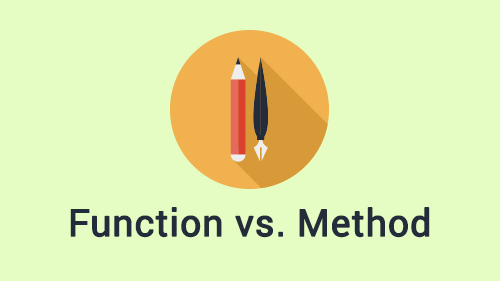

Kotlin programmer dictionary: Function vs Method vs Procedure
source link: https://medium.com/kotlin-academy/kotlin-programmer-dictionary-function-vs-method-vs-procedure-c0216642ee87
Go to the source link to view the article. You can view the picture content, updated content and better typesetting reading experience. If the link is broken, please click the button below to view the snapshot at that time.

Kotlin programmer dictionary: Function vs Method vs Procedure
Function and method are two commonly confused words. While every method is a function, not every function is a method. There is also another word that is erroneously used interchangeably: a procedure. Let’s discuss differences between all of this terms.
Function vs Procedure
Distinction between function and procedure was important in older programming languages. For example, in Pascal functions and procedures are defined using different keywords. Formal difference between this concepts is following:
Function returns a value, while procedure doesn’t.
If they are so similar then why they were differentiated at all? The real reason was that good practices from functional and procedural programs design claimed that procedures should be used only to invoke a set of operations, and functions should be used just to calculate return value (they should have no side-effects). This good design practices were strongly abused. Developers were using procedures to modify objects provided by an argument (e.g. sort(list)) and functions to invoke some operations and return some data that informs about result (e.g. int success = saveData(data)). This way distinction between function and procedure was obliterated.
Can we still define a procedure? We can do it in Java, because every method that doesn’t specify return type is a procedure:
voidprintUser(User user) {
System.out.println(user);
}
In Kotlin there are no procedures, because every function returns at least Unit object. Note that direct analogue of printUser procedure is a function in Kotlin, because it returns Unit:
fun printUser(user: User) {
println(user)
}val result = printUser(user)
print(result is Unit) // Prints: true
Some call such functions “procedures” and I see nothing wrong with that. But you can safely forgot about this word in Kotlin and you will be formally correct. This is good, because the less industry terms you use, the more understandable you are for average audience.

Function vs method
Another big confusion is between function and method. Difference is following:
Method is a function associated to an object.
Function is a more general term, and all methods are also functions. What are methods then? Definitely all member functions and member property accessors are methods:
class A {
fun someMethod() {}
}
In OOP, classes have members that represent their data and behavior. A member of a Kotlin class is either a method or a property. This is why properties defined in the class are called a member property in contrast to top-level properties that are not associated to any class.
What about Java static methods? This is debatable. On the one hand, Java terminology most often names them methods. On the other hand, lot’s of university authoritarians argues that they are not, because they are associated to a class, not to an object. Definitely all top-level functions are not methods.
A bit more problematic are functions of companion objects and object declarations. Companion object functions are commonly used as an analogues of Java static functions, which are not methods:
class MainActivity: Activity() {
companion object {
fun start(context: Context) {
val intent = Intent(this, MainActivity::class.java)
context.startActivity(intent)
}
}
}
From the other hand, companion object is actually an object declaration. Object declaration is actually Kotlin implementation of singleton pattern and all its functions are associated to this singleton object instance. Therefore they are methods.
What about extension functions? Member extension functions, like all member functions, are methods. Top-level extension functions are compiled into static functions with receiver placed as a first parameter. They are not members. On the other hand, it is common to say that they are associated with the receiver type and based on this reasoning we can call them methods as well. On C# nomenclature they are called extension methods and I think it is totally reasonable to name them here this way.
Note that Kotlin uses fun keyword which is a shortcut from function. This is absolutely correct while function is more general word which includes methods, and there are no procedures in Kotlin. Smart :)
In our wording we might always use function, because this is more general word that includes methods. Although it is a good practice to use method term wherever it is more adequate. The reason is the same as when we are saying “dog” instead of “animal” when we know that we are talking about a dog. It provides more information. By making our speech more concrete, we makes it more understandable.
Recommend
-
 151
151
Kotlin programmer dictionary: Statement vs Expression
-
 173
173
Kotlin Programmer Dictionary: Field vs Property
-
 170
170
Programmer dictionary: Class vs Type vs ObjectClass and type are often used interchangeably, while they have the different meaning. What are they? How they both relate to an...
-
 130
130
Kotlin Programmer Dictionary: Object expression vs Object declaration
-
 159
159
Programmer dictionary: Receiver
-
 117
117
Programmer dictionary: Implicit receiver vs explicit receiverThe concept of receivers was previously explained, so make sure you know what rece...
-
 159
159
Programmer Dictionary: Higher Order FunctionIn
-
 117
117
Programmer Dictionary: Function literal with receiver vs Function type with receiverWe’ve already discussed difference between
-
 11
11
User Defined Function versus Stored ProcedureWe are going to show you the difference between a stored procedure and a user defined function in SQL so that you can get on the right path in starting your scripting skills. This article...
-
 12
12
SQL Server View、Function 及 Stored Procedure 定義之快速備份-黑暗執行緒我有個快速備份 SQL 資料庫 View、Function 以及 Stored Procedure 定義的需求,顯然球又飛進 PowerShell 的守備範圍。 SQL Server 有個
About Joyk
Aggregate valuable and interesting links.
Joyk means Joy of geeK